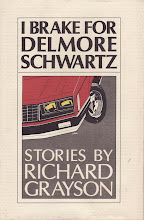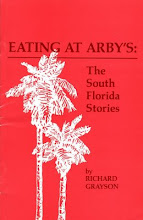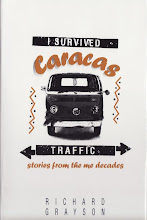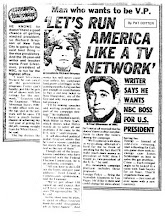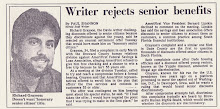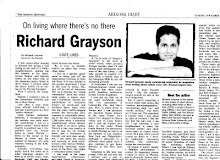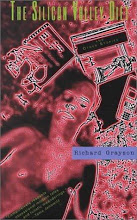
Today, January 7, 2007, Susan Balée reviewed Richard Grayson's AND TO THINK THAT HE KISSED HIM ON LORIMER STREET for the Sunday Philadelphia Inquirer:

Richard Grayson is a funny guy from Canarsie, Brooklyn, and he's been writing short fiction for decades. He's also a lawyer and a teacher, which doubtless does a better job of paying the bills. Which isn't to say he's not a wonderful fiction writer - he is - but his kind of metafiction, mixing his memories (numerous main characters are named Richie Grayson) with his inventions about pansexual borough dwellers dealing with minor and major crises, read like stand-up comedy routines. Only a few of the tales in this book (including the title story) are fully realized short stories in a traditional sense.
At first I wished he'd pen more of the longer, less autobiographical stories, but when I got into the rhythm of his riffs, I changed my mind. Here's his kind of shtick, from "In the Sixties": At the beginning of the Sixties women were girls and girls were chicks. By the end of the Sixties girls were women and chicks were poultry... . In the Sixties... I raised money for a black classmate indicted for murder. I raised money for a Chinese friend to have an abortion. I raised money for Chicano migrant workers I had never met, or expected to meet. Most of the money I raised originally belonged to other people's parents. This is very funny stuff, but it's a comic monologue rather than a story with the traditional elements of plot, characters, setting, and so forth.
Grayson has hit upon a good formula, though, to generate a piece of writing: the annotated list. Hence, he has "Seven Sitcoms," "Branch Libraries of Southeastern Brooklyn," "The Lost Movie Theaters of Southeastern Brooklyn and Rockaway Beach," and so on. But like Grandma's beef brisket, a little of this goes a long way. In these tales of places that mostly aren't there anymore, the main feeling induced in the reader is nostalgia. Unfortunately, if you're not from Brooklyn, much of it is nostalgia for something you never knew in the first place.
Still, in his memories of places he knew as a kid (Mill Basin library, for example, "where I first looked up 'homosexuality' in all the encyclopedias and dictionaries and where I watched the clock so I could go back home in time for Mom to think I'd actually been at Hebrew school, the place I was supposed to be"), we do learn a great deal about Richard Grayson, and he's an interesting guy. A bisexual kid who spent most of his teen years housebound by panic attacks, Grayson read and wrote (and watched TV - hence, "Seven Sitcoms") to survive. Finally, antidepressants helped him regain his sanity and get out of the house.
The fluid sexuality of the characters in these tales adds to their appeal, though mostly the gay main characters suggest Grayson at different ages, from uncertain virgin to gay role model for his young neighbors, Ryan and Sam: I don't get looked at much in any way anymore, definitely not by guys their age. Tempus fugited so fast it seemed like one day I went to bed looking like Chip and woke up the next morning looking like Uncle Charley.
Grayson's expertise on himself, his era, and his homeplace (Brooklyn) convince me that he should shape some of this material into a memoir and forget the metafiction for a while. Memoir is the genre in which Grayson, already an amply credentialed writer, could probably land a decent contract with a publisher people have actually heard of...
Richard Grayson has a fresh, funny voice...
______________________________
Susan Balée's comparative essay on playwrights David Hare and Tom Stoppard is forthcoming in the Michigan Quarterly Review.




